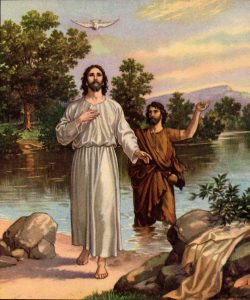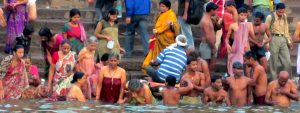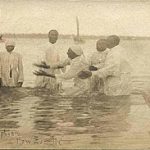
[Wikimedia (public domain)]
Acts 10
10:46b Then Peter said,
10:47 “Can anyone withhold the water for baptizing these people who have received the Holy Spirit just as we have?”
10:48 So he ordered them to be baptized in the name of Jesus Christ. Then they invited him to stay for several days.
The idea that water cleanses — both literally and metaphorically — clearly comes to us from very ancient times, so it should come as no surprise that it shows up in various ways in various traditions. Even within Christianity, the baptism ritual takes many forms. Below you will find a few interesting tidbits about Christian baptism and related practices from other belief systems.
Applying Water
Christian traditions offer several options for applying water during baptism. Interestingly, archaeological and artistic evidence suggest that various methods were used even in the early days of the Christian church.
(CC BY-SA 4.0)]
Here’s a brief run-down of the ways in which water can be applied to the person being baptized.
- Affusion = pouring water over/on the head. This is often done three times (representing the Trinity).
- Aspersion = sprinkling water on the head
- Immersion = submerging all (full immersion) or part (partial immersion) of the body under water. It can be done in a “tub,” a natural body of water (like a river, lake, or stream), or even a swimming pool.
Age of Baptism
Since a person can be baptized at any age, Christian traditions also vary widely in terms of when a person is baptized. Some churches baptize infants; others baptize kids around age 6-7. Still others baptize kids around age 12 or “when a believer is old enough to understand its significance.” Many times, the age of baptism is influenced by specific beliefs about heaven and our relationship with God.
When you combine variations in water application with the open-endedness of age, it results in a pretty high number of permutations. One of the best ways to share different approaches to baptism with kids is to show some of the many You Tube videos available on line. Here are a few to get you started.
Submersion Baptism in a Church (Children)
Submersion Baptism in a Church (Adults)
Submersion Baptism in the Ocean (Adults)
Submersion Baptism in Swimming Pool (Adults)
The Boy Who Couldn’t Wait to be Baptized (Funny)
Dizzying Orthodox Infant Baptism in the country of Georgia
Ritual Cleansing
Several other religious traditions offer their own versions of cleansing.
Judaism
There is a somewhat analogous ritual in the Jewish tradition. When someone converts to Judaism, the process includes a ritual cleansing bath in a mikveh {MICK-vuh}. In ancient times, a mikveh was fed by a natural spring. Nowadays, they often look more like a mini hot-tub.
A mikveh ritual can also be used for many other occasions — just before a Jewish woman gets married, just before the beginning of the Friday Sabbath, to mark life milestones (e.g., bar mitvah, recovery from illness), etc.
[Wikimedia/Arie Darzi (CC BY-SA 3.0)])
[Wikimedia (public domain)]
Hinduism
In India, people often bathe in rivers, especially rivers that are thought to be holy, like the Ganges. This bathing is done before religious festivals and after someone has died.

[Wikimedia/Rolfklein) (CC BY-SA 3.0)]
Shinto (Japanese Indigenous Tradition)
In the Shinto tradition, there is a ritual called misogi that involves being purified by waterfalls. People often pray and fast first; then they head to the waterfall. Traditionally, people stood under the waterfall. Nowadays, people often just touch the water or drink from it, rather than actually bathing in it.
Kids find these different methods of cleansing heart, mind, and soul pretty interesting. Ask them if they were baptized. Ask them if they remember their baptism. Ask them which method seems most scary/joyful/odd to them. And see what they have to say.
Interfaith Sunday School is a weekly blog offering tips for sharing information about the world’s faith traditions to kids. Posts are published on Wednesdays and focus on one of the Revised Common Lectionary readings for the upcoming Sunday. Questions? Contact us at vicki@worldreligions4kids.com.




